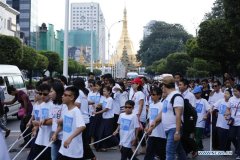Feature: Chinese doctors put their lives on the line to help PNG through health crisis
By Zhang Xiaojun, Matt Burgess
SYDNEY, Oct. 13 (Xinhua) -- It is early May and 48-year-old Chinese doctor Zhang Jinsong can barely walk, leaning against the stair railing of his Papua New Guinean apartment. He is battling a high fever, body aches and swollen eyes.
But those ills are not stopping him from treating the local patients.
"We will risk our lives to help them," Zhang said.
Zhang is the leader of the latest two-year rotation of China's medical team providing assistance to Papua New Guinea's (PNG's) health system forged under a bilateral agreement signed in 2002. The move marked the first time China had sent a medical team of its kind to the Pacific, a sign of the strengthening ties between the two nations.
"One of our closest friends in the international community is the People's Republic of China," PNG Minister for National Events and APEC Justin Tkatchenko told an audience at the opening of the Chinese-built Port Moresby International Convention Center, marking 40 years of bilateral relations.
Infrastructure and building projects are a booming part of Chinese-PNG cooperation, but the development of the health sector continues to form the bedrock of the relationship.
PNG has one of the poorest and least equipped health systems in the world, with only one doctor per 17,068 people, making it highly susceptible to epidemics. Currently, PNG is battling HIV/AIDS, multi-drug resistant tuberculosis, typhoid, malaria and dengue, among other public health threats.
Early in the morning, the Port Moresby General Hospital (POM Gen) deploys its specially equipped wire-meshed van to pick up the Chinese medical team assisting local doctors, only to return in the evening for further duties, such as treating Chinese citizens in the community who are ill.
"I treat about 20 inpatients every month, and receive 60 outpatients every week (at POM Gen)," Zhang said.
However, across the spectrum, the workload for international medical practitioners is bound to increase in a nation ravaged by disease.
China and PNG recently expanded their medical cooperation to implement a new program to combat malaria in remote provinces, while searching for other international partners to bring more doctors with specific expertise into the country.
"Disease and illness do not observe borders, and we in Papua New Guinea must have an open policy to bring in expertise and skills where we can find them around the world," PNG Prime Minister Peter O'Neill said in a statement.
The new program drawing on China's expertise in combating malaria in Africa and parts of Asia seeks to reduce incidence rates by 95 percent in the rural and urban target areas.
Malaria is one of the most common diseases affecting the majority of PNG's rural and urban poor, significantly impacting the development of the Pacific leader by placing an undue burden on its fledgling healthcare system.
"The reality is that we can fight malaria and reduce the cost to our society," Tkatchenko said.
"No one should die from malaria, and the disease can be overcome through both prevention and treatment."
But treating mosquito-borne diseases does not come without risk.
Despite taking major precautions, Zhang and six other members of his 10-person team were still infected with dengue fever, an acute mosquito-transmitted condition described as one of the world's most serious health hazards. The disease is inseparable from their work.
"In the courtyard, we used dichlorvos insecticide to kill mosquitoes; in the room, we use electric mosquito coils and mosquito repellant," Zhang said. "But the prevention and treatment of such diseases require large-scale, anti-mosquito operations by the government. Otherwise, no place will be spared from the health threat."
Safety is another concern for the team. PNG, namely, its capital Port Moresby, consistently ranks high on the world's lists of dangerous places to live in, especially at night.
"For safety reasons, we basically stay within barbed-wire enclosures equipped with a security post during our days off," Zhang said.
When asked if he would attend to an emergency at night, Zhang said he would definitely perform his duty.
"It's tough if there is a life-threatening situation, (but) we must go," Zhang said.
"We are here on a mission assigned by our country and we must complete it."















